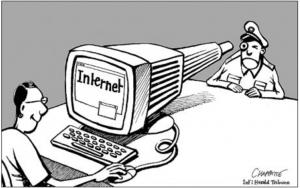 Did you know you leave a trail of data every time you visit the internet?
Did you know you leave a trail of data every time you visit the internet?
Whether your information is shared intentionally or unintentionally, it is being collected by your college, prospective employers, and even companies from which you shop. This is called your digital footprint.
Your digital footprint is normally used to obtain information about you, such as demographics, race, political affiliations or interests. Anything you voluntarily post online also contributes to your digital footprint. This includes videos, blog posts, statuses or photos shared on social media platforms. It’s import to be cognitive as to what you post and how it can be perceived, as it might just be on the internet forever.
As a College student, you have a responsibility to protect your reputation on the internet. You might not be thinking of it now but what you search for and post on the internet can either hurt you or help you.
Here are 3 quick tips you can use to protect their digital footprints:
Google yourself
It seems simple and somewhat narcissistic but if strangers are doing it, then you should be doing it too. Becoming aware of what information is being shared on behalf of your name is as important as anything else. You want to know that if you’re going to apply for an internship or for your dream job, that you won’t lose your chance at landing the opportunity because of an inappropriate image you had posted two years ago. If you’ve been the person who hasn’t been paying attention to what you say or post on social media, your digital reputation might come to a surprise to you. It’s time to clean the mess up.
“In the future your digital footprint will carry far more weight than anything you might include on a resume.”
Think before you post
You have to ask yourself, “what do I want people thinking of me?” and “how do I want to be remembered?” Once it comes time to submitting resumes and looking for internships, or evening applying for a master’s program, you want to have a peace of mind that your social presence is the last thing you’d need to think about. Once something is posted, it can be difficult to remove.
Rule of thumb: If you wouldn’t want your parents seeing it, you’re better off not posting it.
Scale back on social media
If you’ve constantly caught yourself on social media and surfing the internet then you might have a slight addiction. It’s time to slowly scale back on social media and focus on prioritizing what’s important. After all, the less time you spend on social media the less you’d have to worry about posting, commenting on or liking a photo that might get you in some sort of trouble in the long term. An alternative can be studying, reading a book or heading to the gym for a brief workout. Anything that can get your mind off being on the internet a few extra hours during the day would be a healthy activity.
As you you get closer to graduating and starting a full time job or your business, you’ll start to realize the importance of protecting your image and reputation and how it relates to your next big opportunity. Be smart when it comes to personal branding and always remember to
“It’s important you are educated on the impact social media can have on your future. The use of profanity, images of you with alcohol, bullying, wearing skimpy clothing are all examples of how it may cost you a scholarship. It’s not just the scholarship you should be concerned with either. College admissions offices and employers are also going to be using social media to better understand what kind of candidate you are.” – Kara Hill (My Recruiting Solutions)





